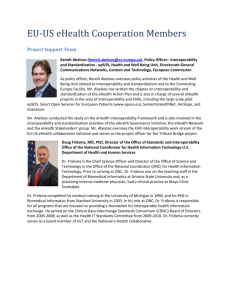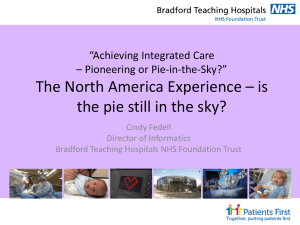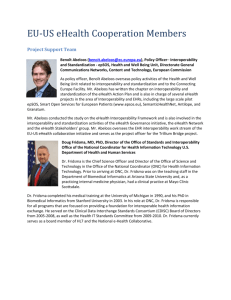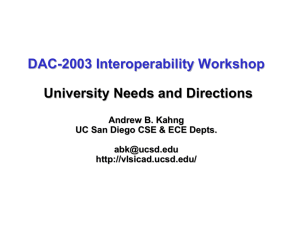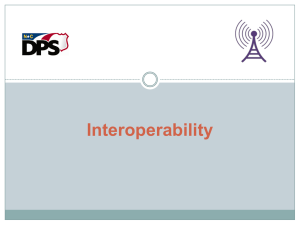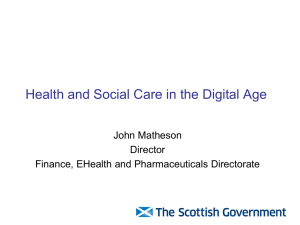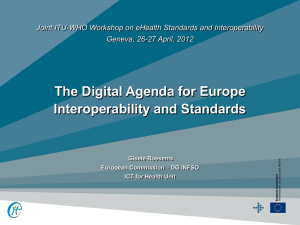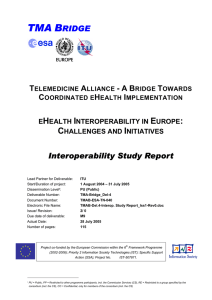Interoperability of EHR Work Group 8-28
advertisement
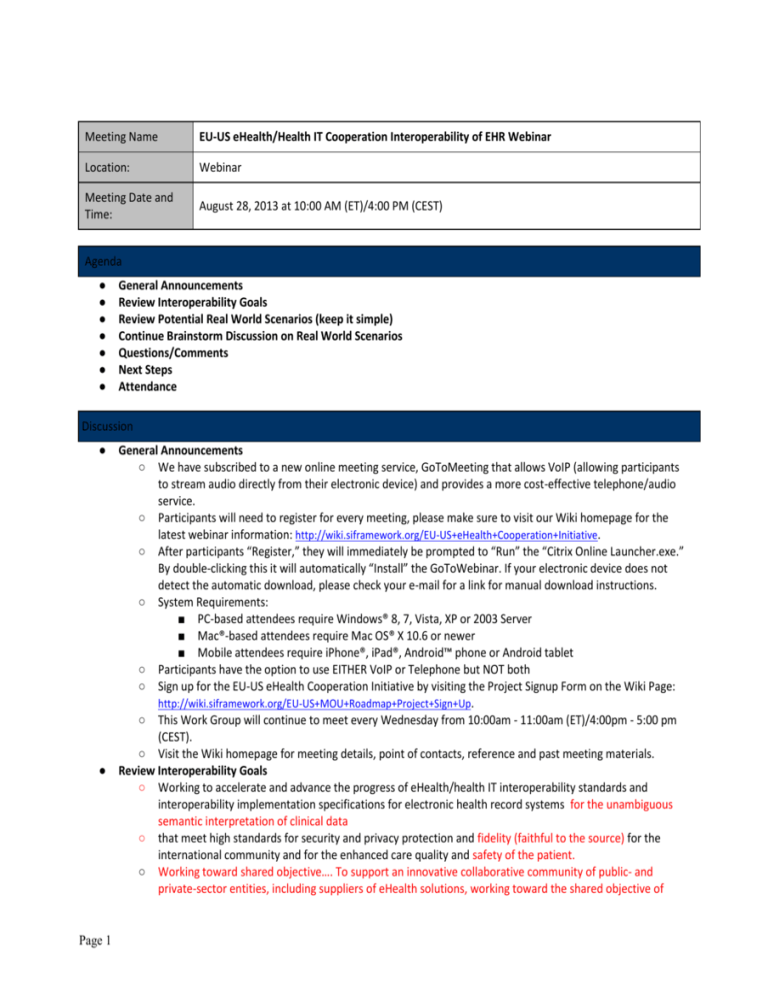
Meeting Name EU-US eHealth/Health IT Cooperation Interoperability of EHR Webinar Location: Webinar Meeting Date and Time: August 28, 2013 at 10:00 AM (ET)/4:00 PM (CEST) Agenda ● ● ● ● ● ● ● General Announcements Review Interoperability Goals Review Potential Real World Scenarios (keep it simple) Continue Brainstorm Discussion on Real World Scenarios Questions/Comments Next Steps Attendance Discussion ● ● Page 1 General Announcements ○ We have subscribed to a new online meeting service, GoToMeeting that allows VoIP (allowing participants to stream audio directly from their electronic device) and provides a more cost-effective telephone/audio service. ○ Participants will need to register for every meeting, please make sure to visit our Wiki homepage for the latest webinar information: http://wiki.siframework.org/EU-US+eHealth+Cooperation+Initiative. ○ After participants “Register,” they will immediately be prompted to “Run” the “Citrix Online Launcher.exe.” By double-clicking this it will automatically “Install” the GoToWebinar. If your electronic device does not detect the automatic download, please check your e-mail for a link for manual download instructions. ○ System Requirements: ■ PC-based attendees require Windows® 8, 7, Vista, XP or 2003 Server ■ Mac®-based attendees require Mac OS® X 10.6 or newer ■ Mobile attendees require iPhone®, iPad®, Android™ phone or Android tablet ○ Participants have the option to use EITHER VoIP or Telephone but NOT both ○ Sign up for the EU-US eHealth Cooperation Initiative by visiting the Project Signup Form on the Wiki Page: http://wiki.siframework.org/EU-US+MOU+Roadmap+Project+Sign+Up. ○ This Work Group will continue to meet every Wednesday from 10:00am - 11:00am (ET)/4:00pm - 5:00 pm (CEST). ○ Visit the Wiki homepage for meeting details, point of contacts, reference and past meeting materials. Review Interoperability Goals ○ Working to accelerate and advance the progress of eHealth/health IT interoperability standards and interoperability implementation specifications for electronic health record systems for the unambiguous semantic interpretation of clinical data ○ that meet high standards for security and privacy protection and fidelity (faithful to the source) for the international community and for the enhanced care quality and safety of the patient. ○ Working toward shared objective…. To support an innovative collaborative community of public- and private-sector entities, including suppliers of eHealth solutions, working toward the shared objective of ● ● ● ● ● Page 2 developing, deploying, and using eHealth science and technology to empower individuals, support care, improve clinical outcomes, enhance patient safety and improve the health of populations. ○ To have international interoperability of electronic health records information to include: ■ semantic interoperability; ● Including “levels” of achievement ○ syntactic interoperability; and ○ patient mediated data exchange (including privacy and security issues surrounding exchange of health data). ○ Three key goals of the technical work stream: ■ Identify a subset of commonly used vocabularies and terminologies that can serve as the basis of an internationally recognized subset to support semantic interoperability (shared meaning). ■ Harmonize the formats (or structures) for how information is structured to support syntactic interoperability ■ Support the use of Patient Mediated Data ■ Identify a working group (complete) and to begin defining pilot projects. Review Potential Real World Scenarios (keep it simple) ○ Goal: Identify a subset of commonly used vocabularies and terminologies that can serve as the basis of an internationally recognized subset to support semantic interoperability (shared meaning). ○ Creating Scenarios helps determine which problem to address first ○ Further along in the Workgroup process we will discuss which vocabularies are relevant to that Real World Scenarios ■ Rather than bringing every vocabulary and terminology and standard to the table start with the ones that support the user story and expand from there ○ It is simple and achievable (we want to declare success) ○ It is feasible and broadly realistic ○ It is patient centric (to start) Continue Brainstorm Discussion on Real World Scenarios ○ Moving From Country to Country ■ Regional issues – maybe not even country to country?? Can we constrain this or should we constrain this? Or even provider to provider ○ Broken Eyeglasses ○ Ran out/forgot of prescription medication while on vacation and need it refilled (for example blood pressure medication) ○ Ambulatory (patient has pre-existing condition such as diabetes that has been out of control and needs to fix the ○ Patient has a heart attack and ends up in the ER (or patient is hit by a car) ■ Foreign speaking hospital ■ When returning home information is able to follow them home (push – to go back home) ○ Group of students traveling with chaperon and chaperon needs to get medical records for treatment ○ Are we covering Military??? (pure military or quasi deployment) – sudden outbreak/natural disaster - NO Quarantine situation and public health entity that this is happening Blue Button ○ Portal being able to access by both patient and provider ○ Cell phone to hold the records Planned Care ○ New USA citizens have a baby and they get their European parents to come and baby-sit 6 months at a time each (mother, then mother-in-law). The mother has breast cancer that has been treated in Europe but ● ● ● ● Page 3 need monitoring etc. Healthcare insurance is provided by the family, she needs her USA physician to interact with her oncologist in Europe. (patient and provider-mediated access). ○ An elderly, but not yet retired, man lives 6 months in USA and 6 months in Europe to care for his elderly mother. He was recently diagnosed with prostate cancer and had radiation treatment. He also has advanced degenerative disease and several other health conditions. He needs regular PSA monitoring, bone scans etc. Immunizations (tetanus) A real world scenario of interest to us at King’s College London is where EU & US universities collaborate in health research studies and clinical trials: it would be excellent to have the semantic and syntactic means to reduce or eliminate the extra work to harmonize data sets. Querying population for outbreak ○ Query for recalled prescription Questions/Comments o Stephan Schug: Should we add "documentation?" o Stephan Schug: Will try to come up with a wording proposal. o Stephan Schug: I think we cannot be more specific at this stage. o Stephan Schug: While I like the overall message of the third bullet, I am wondering whether we are overloading the scope. There might be something in this bullet that we could use. The emphasis should be on the first sentence “to support,” but any future ideas to make this bullet less crowded are welcomed. o Stephan Schug: Isn't it mixing objectives and tools/implementation? o Gerard Freriks: Yes the structure data is used in is of importance. o Gerard Freriks: These formats allow us to define forms with data. o Gerard Freriks: There are documentation related standards / formats. o Omar Bouhaddou: What does “patient mediated data” mean? Do we mean patient mediated exchange? Data that patient hands to a physician in comparison to what a provider already has. o Omar Bouhaddou: Or, do we mean 'incorporate' patient self-entered data. o Omar Bouhaddou: Real world scenario: going abroad for healthcare (medical tourism) o Rachelle Blake: How about adding-- Identifying areas to improve continuity of care through interoperability. o Rachelle Blake: How is the bullet point “Support the use of Patient Mediated Data” measured as an achievable goal? Should it be more specific? It may be a little broad, maybe we could add some sun-bullet points to make it more clear. o David Tao: I notice the question about self-entered data. I suggest that the initiative NOT CARE about who entered the data. The point is exchanging it once it's been entered by whomever. o Gary Dickinson: Where will the definition of ""interoperability"" appear? We’re in the process of creating a terminology wikipage that will act as a glossary. o Gary Dickinson: I don't know what "eHealth science and technology"" is. o Gary Dickinson: If we are to "advance the progress of eHealth/health IT interoperability standards…," don't we need some milestones? To show where we are? And to show "progress" going forward? The internal support team is creating milestones that can be agreed upon by both sides and will be presenting it when completed. o Walter Suarez: There is a difference between Goals/Purpose of the Initiative (which I think these bullets really are aimed at) and Scope Statements, which I think refer to what are the focus areas, targets, etcs. o Walter Suarez: More than a Scope Statement, that bullet reflects the overall goal of the initiative. o Ana Estelrich: I think that in the roadmap (long term) the following should be kept in mind in term of the planned cared (and cancer can be replaced by any other complex pathology such as cardiovascular, diabetes, renal disease etc. o ● Vasu Iyengar: Should this just read 'Incorporate Blue button plus project recommendations for data holders and application providers' o Robert Coli: Does "unambiguous semantic interpretation of clinical data" refer to machine or human readability, or both? Next Steps a. Please refer to EU-US eHealth Cooperation Wikipage for latest meeting dates/times and Work Group information. The next Work Group meeting will be Wednesday, September 4, 2013 at 10:00 AM (ET)/4:00 PM (CEST). Attendance: Amanda Merrill Ana Estelrich Andrew Seale Barry Robson Brian Handspicker Catherine Chronaki Chad Freeman Chris Doucette Claudio Saccavini David Tao Didi Davis Don Mon Ed Conley Gary Dickinson Gayathri Jayawardena Gerard Freriks Gora Datta Homer Papadopoulos Jamie Parker Kyriakos Hatzaras Lisa Spellman Marcello Melgara Maria Riganelli Mark Roche Max Tamil Omar Bouhaddou Rachelle Blake Rachelle Kaye Rita Torkzadeh Robert Coli Ronald Cornet Seema Gai Serafina Versaggi Stephan Schug Vasu Iyengar Virginia Riehl Page 4 Walter Suarez Page 5

